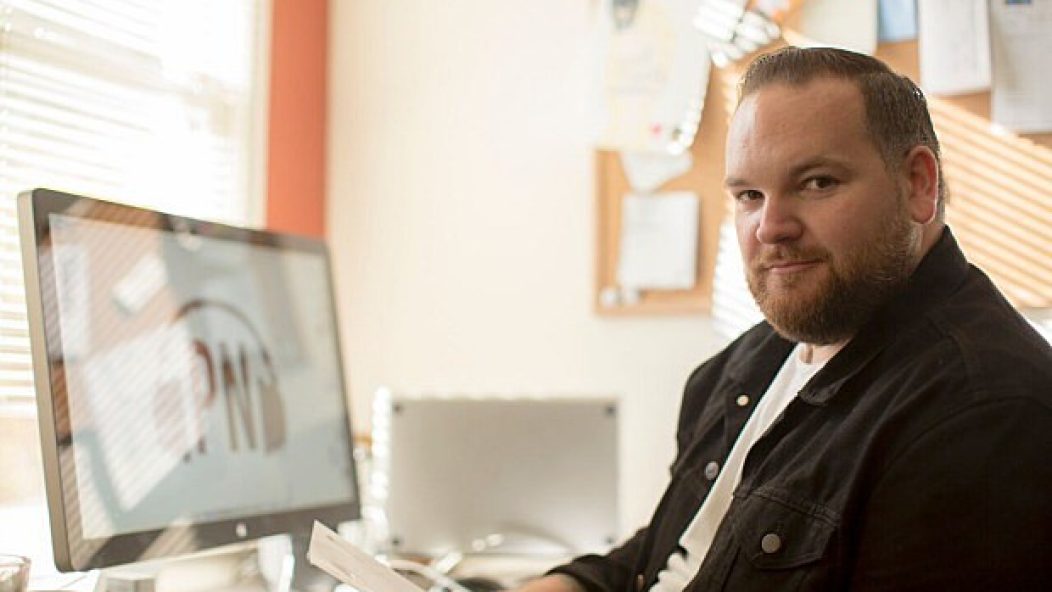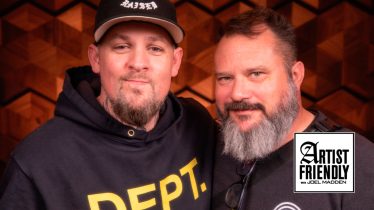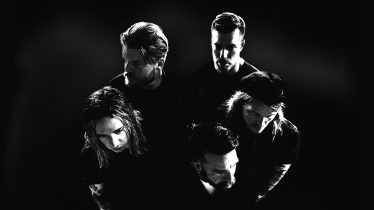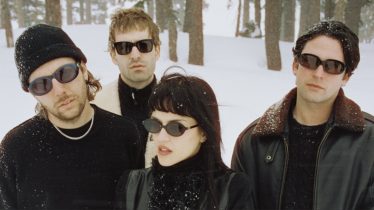
Pure Noise Records founder Jake Round talks community, accountability—and Front Porch Step
Epitaph, Fat Wreck Chords, Hopeless, Equal Vision, et al – these indie institutions invested decades in the scene issuing some of the most important records in alternative music culture. Pure Noise Records earned its way into their prestigious ranks in just six years, thanks to a handful of vibrant contemporary releases with a needle in today’s proverbial grooves. The Story So Far, State Champs and Four Year Strong all have popular records in the California label’s catalog. Like any success story, the label’s growth came with some growing pains: namely, the troubling scandals with Front Porch Step and No Good News. In this Q&A, Pure Noise founder Jake Round guides AltPress through his own “story so far.”
Photo: Matt Vincent
What was your introduction to the scene?
JAKE ROUND: I asked my mom to get me subscriptions to [the skateboarding magazines] Thrasher and Transworld for my 15th birthday. Thrasher came with a skate video called Raw, which had basically a Fat Wreck Chords soundtrack – NOFX, Lagwagon, No Use For A Name, Strung Out. It became the soundtrack to my teenaged years. The first show I went to by myself was Strung Out in Victorville, California.
Were you into the overall sense of community, as well as the music?
Absolutely. The punk-rock community definitely spoke to me. I've always been very social. I liked being a part of something. When I was really young, I liked being a hockey player. As a teenager, I really liked being into punk rock. It was my life, my identity. I've always been someone who dives in fully to whatever it is I'm engaged in. I'm 32 years old and at this point, music is my life. It's what I do for fun. It’s my work. It’s my livelihood.
When did you feel that urge to contribute?
That's very natural in the alternative music community because everyone does feel like a part of it and you want to find your role. I wanted to be a musician. I started playing bass when I was 16 or 17. I kicked around in garage bands. I was involved in other things in high school, like athletics, so it was never my only focus. But I stuck with it. I had another band in college that started to play a lot of local shows in Southern California. I was always intrigued with the organizational, business aspects of punk-rock music. I liked that it was self-enabling. The first tours I did I booked myself through emails, MySpace messages and calling promoters. Something that's a bit different about my label than some of the others is that I started off as a DIY touring musician. So I have a lot of perspective on what it's like to eat Taco Bell every day and sleep on gross floors. I still own a 15-passenger van and trailer. They're parked at my mother's house [Laughs]. I was in my late twenties at shows passing out postcards. There were some moments where I was like, “What am I doing? I'm out on Warped Tour selling T-shirts at 29 when I went through six years of higher education? I'm not sure this is what Mom had in mind!”
How did your internship at Fat and your job at AMP help shape Pure Noise?
There were three main reasons I started Pure Noise. One was that I really wanted to work for myself. I've never liked to be told what to do. The second was that my friends in No Bragging Rights needed to put a record out. I was in a metalcore band called Create Avoid and no one wanted to put out my record [Laughs]. So I was like, “You know what? Fuck it. I'm gonna start my own label.” I'd been at AMP selling advertising for about a year, so I had gotten to know label people and managers. I had those contacts and a little money I borrowed from my mother when I released [PNE 101] The Consequence Of Dreams from No Bragging Rights in 2009. I wanted to create the kind of label I perceived Fat Wreck Chords to be. It's impossible to have 20 bands on your label that all love each other, but I wanted a cohesive, family environment where people are proud to be on the label. That was the overall goal. But getting started was as simple as just continuing with the DIY attitude. “Well, nobody wants to put out my record, or my friends' record, and I think they're pretty good, so I'm going to do it myself!”
What were the early challenges in taking it from a hobby to a real business?
Cash flow was a huge issue. I thought I'd make the money back from one record and then put out another one. That is essentially what happened but it took much longer than I expected. You have to be patient and persistent, which of course, you don't want to hear when you're starting out. But every year we've been in business, we've done better than the previous year by considerable amounts. I started out in my bedroom. I didn't move the label out of my apartment until year four, which was when I paid myself for the first time, too. It was still a live-in workspace. I paid my rent from Pure Noise but I was working at night. It wasn't until year five that I was able to quit my other jobs.
How many employees do you have now?
I have two full-time employees and one part-time person, freelance publicists and a freelance designer. As recently as 18 months ago, it was still a one-man show.
I love that idea of a shared community vibe within a label.
The vibe I really wanted is this: all things young and punk rock. There's the sort of post-punk/indie rock of a band like Gates and on the other end of the spectrum, there's Counterparts, a hardcore/metalcore band, and there's the pop-punk stuff in between. The commonality is the demographic of kid that likes this kind of music and aesthetic. Whether they're playing post-punk or metalcore, it's all still sort of in the punk rock vibe.
Which releases catapulted Pure Noise commercially?
In June 2011, The Story So Far's Under Soil And Dirt sold like 1,000 copies the first week, all direct-to-consumer and iTunes. Hot Topic took, like, 240 CDs. I went on Warped Tour working for Rise Records that summer. Craig [Ericson] let me sell my CDs at his table. He was really supportive. I could tell something was going on. I was getting my statements back and I was like, “This isn't just a couple hundred bucks anymore. I need to get home and really work on this.” That's when it really sunk in that something was going on. We had one band really take off and were fortunate enough to have them stick with us, which allowed us to make the most of the momentum that we had. As we both know, a lot of this business comes down to timing and luck. Having successful records is much more about making records people want to listen to than it is about marketing strategies. The best advertising money I've ever spent was on good recordings.
You’ve put out a lot of records with a lot of bands at this point; Brigades Indefinite is PNE 172. A couple bands ran into controversy. What did you learn from that?
Social media gives kids a greater look into the lives of the artists they love than ever before. That's sort of a [double-edged sword]. It's impossible for anyone's entire story to be told in 140 characters. In the two instances we've dealt with recently, the levels of infraction were drastically different. However, one thing we noticed was that both artists were treated the same way in the court of public opinion, to paraphrase Kevin Lyman. Both were accused of far greater crimes in the blogosphere than were actually committed. I've thought a lot about it. It's sort of human nature to sensationalize and embellish things, but it creates an environment of misinformation that makes it difficult to get a fair and honest assessment of a situation as it pertains to everyone involved. Something I've really personally struggled with is that I really just wanted to do the right thing for everyone involved. Of course, the right thing isn't necessarily the easy thing.
I'm sure people expected you to have answers about this stuff, but is it difficult to know everything about everyone when you sign them?
That's a great point. Obviously, we're talking about the Front Porch Step and No Good News scenarios. My introduction to the business side of things was at Fat Wreck Chords 10 years ago. There was never a discussion about the label being involved in the personal lives of the artists. Never once was the idea of a “background check” brought up. Oftentimes, the deals were handshake deals, or one-album deals. It was a very informal relationship that the labels had with the bands. It was really about trust. We've had to learn about the changing social environment, what people expect, and what we have to expect from our bands. Going forward, we're definitely going to consider things like an artist “code of conduct” in our recording agreements. We're going to consider looking into the previous online and social activities of the artists that we sign, because things have changed. We want to continue to learn from those changes.
What's the status of Front Porch Step and Pure Noise Records now?
We are no longer working with Front Porch Step.
What do you think about Warped allowing Front Porch Step to play this week?
I have the greatest respect for Kevin Lyman. I trust he is doing what he thinks is right.
What’s up with No Good News?
No Good News decided to disband.
What does the rest of 2015 look like for Pure Noise?
The Story So Far album was the No. 2 Independent Album in the country with the biggest first week sales we've ever had. We're really excited and exhausted by that [Laughs]. We have Counterparts coming in July. The album is fantastic. They fit the Pure Noise vibe perfectly. State Champs will be a huge record for us in the fall. The band just did a great tour with All Time Low and played stadiums in Australia with 5 Seconds Of Summer. We're fortunate to be working with Sony/RED on the distribution side now and have been able to offer our bands a lot of opportunities because of our relationship there.
What advice would you give to someone wanting to start a label?
Hang around, stay around and don't expect it to happen overnight. What's most important is that you're involved in the community. That doesn't mean you have to be in a band, but you have to be there. You have to go to shows. You have to listen to the records. Volunteer, intern, do whatever it is that you can do, whether it's your college radio station or helping your local promoter. Don't expect it to pay you anything for a really long time. The main thing I wanted to achieve was to release an album people would listen to, talk about, and care about for a long time. I knew if I did that, the sales would take care of themselves. I think we've released a few of those at this point. The business side of it will take care of itself if the albums mean something to people. alt







